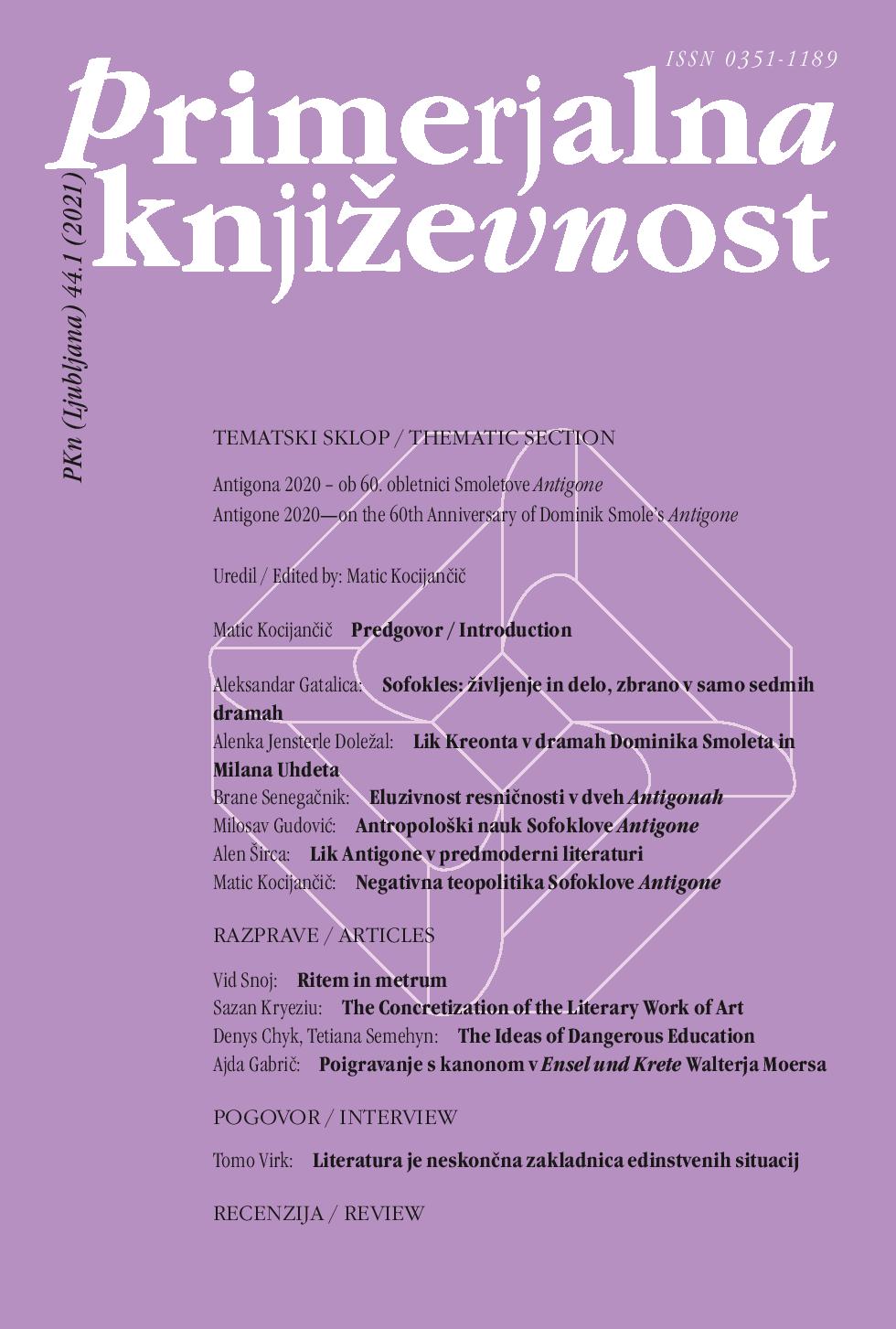On Greatness and Dignity of the Victim: The Anthropological Lesson of Sophocles’s Antigone
DOI:
https://doi.org/10.3986/pkn.v44.i1.04Keywords:
Greek tragedy, Sophocles: Antigone, philosophical interpretation, victim, the Sacred, brotherhood, Hölderlin, Friedrich, Heidegger, Martin, philosophy of tragedyAbstract
This article is devoted to the interpretation of certain anthropological aspects in Sophocles’s tragedy Antigone. Starting with the initial verses of the first song of the Theban elders’ chorus, the author examines the semantic fabric of the expression to deinón and the superlative to deinótaton, in which Sophocles condenses his teaching about man. The article also examines the antagonistic attitude of the main heroine, her rebellion against the royal decree forbidding the burial of Polynices, the enemy. Despite the prohibition, Antigone decides to bury her brother and, thus, to defend the sacral order from tyranny. The author takes the position that Antigone’s forbidden burial, the outpouring of sacrifice, and ultimately death itself, are a paradigm of tragic heroism and Sophocles’s understanding of anthropological greatness and non-violent force. In the second part of the article, the author addresses the fundamental opposition between enmity and brotherhood as an internal antagonism that triggers the dramatic action of Antigone. The decision in favor of brotherhood, against enmity, proves to be the first vocation of man and a seminal ethical-anthropological guidepost.
References
Dokler, Anton. <em>Grško-slovenski slovar</em>. Ljubljana: Knezoškofijski zavod sv. Stanislava, 1915.
Gadamer, Hans-Georg. <em>Ästhetik und Poetik I. Kunst als Aussage</em>. Tübingen: Mohr-Siebeck, 1993.
Gudović, Milosav. »Martin Heidegger in bistvo tragedije«. <em>Primerjalna književnost</em> 36.3 (2013): 19–40.
Heidegger, Martin. <em>Beiträge zur Philosophie</em>. Frankfurt ob Majni: Klostermann, 1999.
Heidegger, Martin. <em>Zur Bestimmung der Philosophie</em>. Frankfurt ob Majni: Klostermann, 1989.
Hölderlin, Friedrich. <em>Poetični fragmenti</em>. Prev. Aleš Košar. Koper: Hyperion, 2012.
Hölderlin, Friedrich. <em>Sämtliche Werke</em>. Stuttgart: J.G. Cottasche Buchhandlung Nachfolger, 1943.
Hribar, Tine. <em>Tragična etika svetosti</em>. Ljubljana: Slovenska matica, 1991.
Kocijančič, Matic. »Kdo <em>ni</em> pokopal Polinejka? Skrivnost dvojnega pokopa v Sofoklovi <em>Antigoni</em>«. <em>Primerjalna književnost</em> 41.1 (2018): 9–27.
Otto, Rudolf. <em>Sveto. O iracionalnem v ideji božjega in njegovem razmerju do racionalnega</em>. Prev. Tomo Virk. Ljubljana: Hieron, 1993.
Senegačnik, Brane. »Humanistična branja Sofoklove <em>Antigone</em> in humanistično razumevanje humanega«. <em>Primerjalna književnost</em> 41.2 (2018): 169–189.
Smole, Dominik. <em>Antigona</em>. Ljubljana: Državna založba Slovenije, 1972.
Snoj, Marko. <em>Slovenski etimološki slovar</em>. 3. izd. Ljubljana: ZRC SAZU, 2016.
Sofokles. <em>Antigona</em>. Prev. Kajetan Gantar. Ljubljana: Slovensko narodno gledališče Drama, 2017.
Šijaković, Bogoljub. <em>O patnji i pamćenju</em>. Beograd: Čigoja, 2012.
Windelband, Wilhelm. »Das Heilige. Skizze zur Religionsphilosophie«. <em>Präludien: Aufsätze und Reden zur Einleitung in die Philosophie und ihrer Geschichte</em>, Bd. 2. Tübingen: Mohr, 1924. 295–345.


